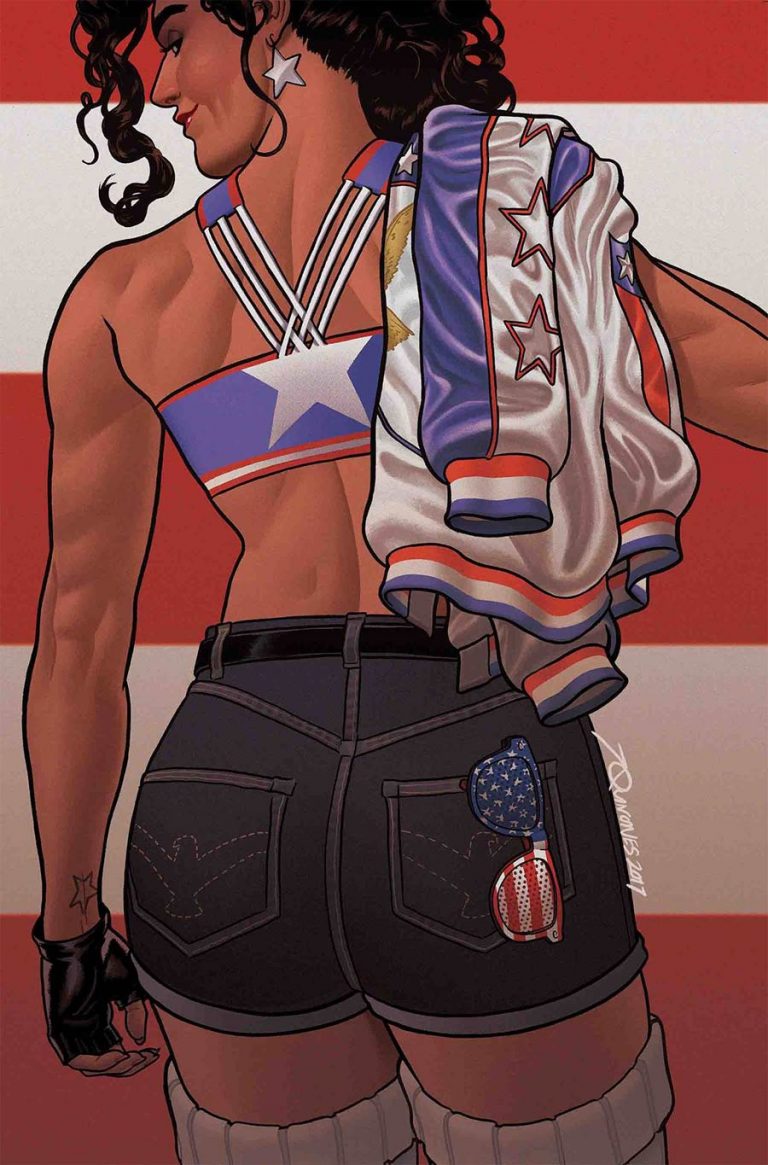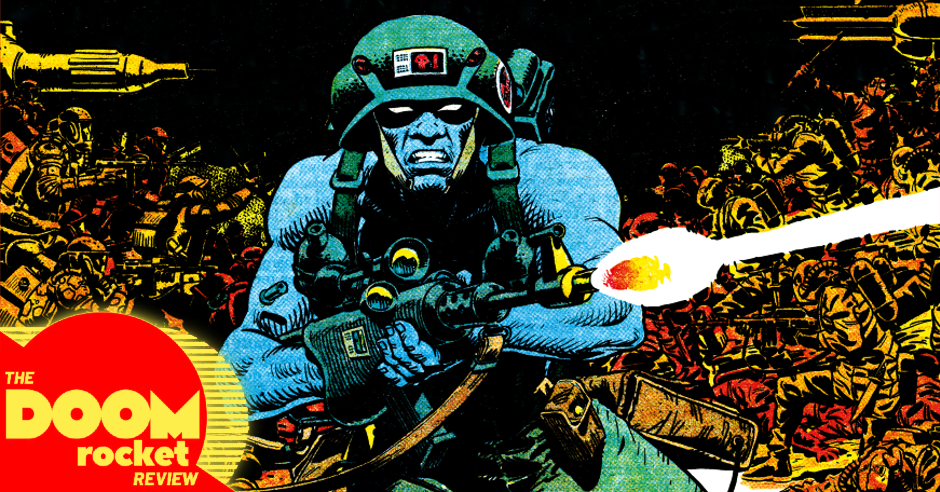By Don Alsafi. America Chavez is a relatively new addition to Marvel’s stable. Debuting in the 2011 miniseries Vengeance by Joe Casey and Nick Dragotta, she’s since appeared in titles such as A-Force, Gillen & McKelvie’s Young Avengers, and the recently-wrapped Ultimates.
The character has been particularly notable as an example of Marvel’s progressive push in recent years toward their heroes reflecting a more diverse variety of backgrounds and personalities. While we’ve not been shy in criticizing Marvel’s having changed too many of their core characters all at the exact same time, it’s undeniable that the classic heroes created in the 1960s are all (token women aside) just a bunch of white guys.
By contrast, America Chavez is a queer Latinx young woman, and is thus especially emblematic of Marvel’s move away from the White Dudes Only club. As a result, the character has been eagerly embraced by those readers interested in seeing a part of themselves reflected, or even just those who want to see the modern world, with its wonderful variety of peoples, more accurately and thoroughly portrayed.
Which is all well and fine. But is the book any good? With America’s first story arc behind her, let’s pop in with issue #7 and find out…
Written by Gabby Rivera.
Art by Jen Bartel, Annie Wu, Ming Doyle, Aud Koch, and Joe Quinones with Joe Rivera.
Colors by Jen Bartel, Rachelle Rosenberg, and Jordan Gibson.
Letters by Travis Lanham.
A journey through time and space. Although the publisher info indicates that this is the beginning of the second story arc, author Gabby Rivera has no qualms about throwing new readers into the deep end! After the events of the first arc, America finds herself on a journey both cosmic and deeply personal, with her long-lost grandmother as her interdimensional guide. Strangely enough, with their tour of her family’s history encompassing elements both metaphysical and mythological, it’s more than a little reminiscent of the best parts of Alan Moore and J.H. Williams III’s Promethea.
Granted, it can be a bit confusing, as the story’s hit-the-ground-running approach does mean that there are certain concepts new readers will only pick up via occasional context clues. For instance, references abound to something called “star portals” – so America is a teleporter then? Is that her only power? (And… “portal punching”? What’s that about?)
On the one hand, opening the issue by throwing around terms like “The Utopian Parallel” (without really describing what that means) can be, initially, a little off-putting. Once you cut through the sci-fi trappings, though, you quickly discover that it’s a story about a young woman who’s lost both her parents, and the newly-found grandmother who can tell her stories from the past to ease that loss.
Sci-fi from the heart. So what we have is a story about reconnecting with one’s past, and a history and culture once thought irrevocably lost. But it’s also a love story, and a story of immigration. When America’s mother was young, their home dimension was invaded, and so they fled to another. Its native denizens welcomed these refugees with open arms, and it’s there that the two women who would become America’s parents first met. The various details mark the narrative as incredibly unique, but at its heart the themes being conveyed are very human ones, and make it a story that anyone can relate to, and feel for.
Yes, for the uninitiated the history is at times a bit odd and confusing – but on reflection, that might not be entirely by accident. The history America discovers has something of the familiar yet alien feeling you get when you hear stories about your parents (or grandparents) when they were young, or when you visit an ancestral home you’ve always heard of but never seen. It can feel like something that happened in a dream, intimately a part of you and yet completely foreign.
If you weren’t feeling charitable, you could perhaps chalk up this vague sense of confusion to the relevant back story not being fully explained to the new reader. On the other hand, one might ponder whether this discombobulation is deliberate, or an especially clever ploy on the part of the writer, intentionally leaving the reader as flummoxed and out-of-sorts as the title character herself.
A pictorial feast. While the writing in this comic dazzles with its ability to craft a multidimensional tale of love and loss, the art within is similarly set to impress. The dizzying tale of times and worlds past is illustrated by a veritable murderers’ row of impeccable artists – and one can’t help but notice that (with the exception of regular artists Joe Quinones and Joe Rivera turning out the final page) the visuals were entirely created by women.
And what a stunningly gorgeous collection it is! Jen Bartel opens the story, her breathtaking art setting the stage for the rest of the issue. Annie Wu, Ming Doyle, and Aud Koch all follow, and Rachelle Rosenberg colors over these three styles with the palette Bartel established at the outset, providing a unity despite the ever-changing art styles.
Readers are used to the occasional sight of a surprisingly crowded credits box. Often this simply means the main artist fell behind, and needed more hands just to get the book out on time (regardless of whether those additional artists mesh). What the editorial team have put together here, by contrast, may have started as a measure to give the regular art team some more breathing room – but the execution implies far more thought was put into the relief artists than what usually occurs. Readers are thus treated to a visual showcase both sumptuous and brilliant.
As with Runaways #1 last week, America #7 feels like a story crafted by a writer experienced enough to know the rules, but also talented enough to know when and how to break them – for good effect.
If this comic were your first exposure to this character, you might be a bit unsure as to specific aspects of the hero and her background. But in the end, the story of an orphaned teenager reconnecting with a long-lost family member, with the resulting feelings of gratitude, abandonment, acceptance and joy that come with it, is at its heart a very human story about loss and moving forward.
This one issue won’t answer all your questions – but it does show clearly, proudly, defiantly, that its heart is in the right place. And sometimes that’s all you need to come back for more.
8 out of 10
















